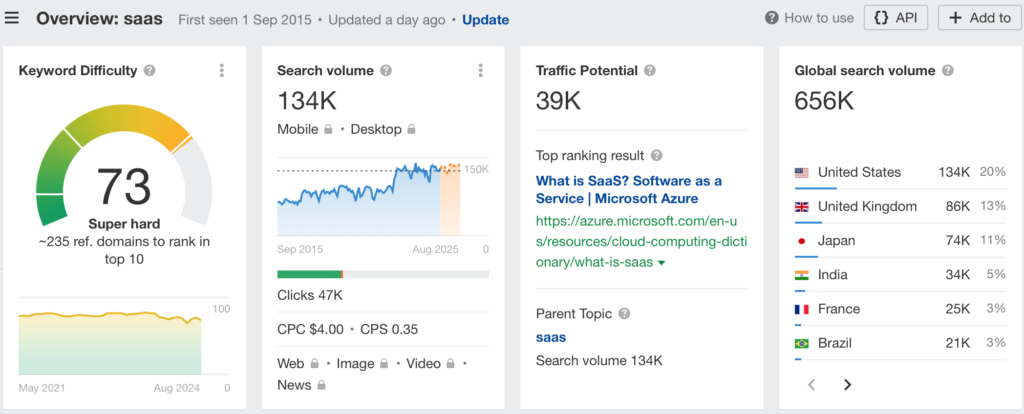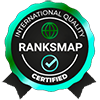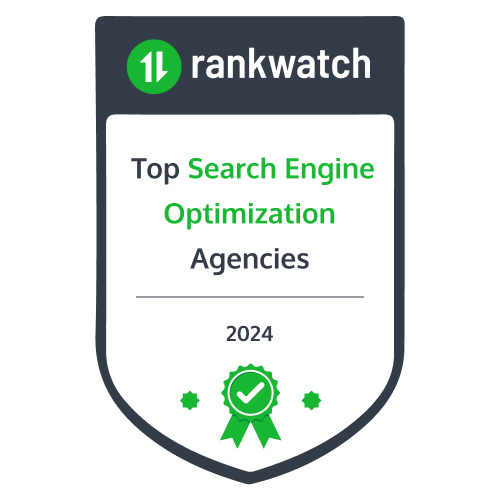In the competitive world of SaaS, having a strong SEO strategy is critical to drive organic traffic, generate leads, and build brand authority. Here are key components to consider:
1. Keyword Research and Optimization

- Targeting High-Intent Keywords: Focus on keywords that reflect a user’s intent to find solutions similar to your SaaS offering. This includes a mix of branded keywords, product-focused terms, and problem-solving queries.
- Long-Tail Keywords: Incorporate long-tail keywords in your content that address specific customer needs, pain points, or niche features of your SaaS. This helps in capturing users at different stages of the buyer’s journey.
- Competitor Analysis: Regularly analyze competitors’ keywords to identify gaps and opportunities in your own strategy. Tools like SEMrush, Ahrefs, and Moz can be particularly useful here.
2. Content Marketing

- Educational Content: Develop a blog, resource center, or knowledge base that educates users about industry trends, best practices, and how your software can solve their problems. This positions your brand as an authority in the field.
- Case Studies and Whitepapers: Publish in-depth case studies, whitepapers, and eBooks that demonstrate the value and ROI of your SaaS. These are excellent for both SEO and lead generation.
- Video Content: Leverage video tutorials, webinars, and product demos. Video content can significantly boost engagement and is favored by search engines.
3. On-Page SEO
- Meta Tags and Descriptions: Ensure that every page has optimized meta titles and descriptions that include primary keywords and are compelling enough to drive clicks.
- User Experience (UX): Google prioritizes websites that provide a great user experience. Ensure that your site is fast, mobile-friendly, and easy to navigate. Clear CTAs and intuitive design can reduce bounce rates.
- Schema Markup: Implement schema markup to help search engines understand your content better and improve your chances of appearing in rich snippets.
4. Technical SEO
- Site Speed: SaaS platforms must prioritize fast load times. Use tools like Google PageSpeed Insights to identify areas of improvement.
- Mobile Optimization: With the increasing number of users accessing SaaS platforms via mobile, responsive design and mobile optimization are non-negotiable.
- Secure and Reliable Hosting: Use HTTPS to secure your website and improve trust with users. Regular audits and updates ensure that your SaaS site is reliable and secure.
5. Link Building

- Quality Backlinks: Focus on acquiring high-quality backlinks from reputable sites. Guest blogging, partnerships, and PR efforts can help in building authority.
- Influencer and Community Engagement: Engage with influencers and thought leaders in your industry. Participating in community forums and contributing to discussions can also generate valuable backlinks and drive traffic.
- Customer Reviews and Testimonials: Encourage satisfied customers to leave reviews on third-party sites like G2, Capterra, and Google My Business, as these can drive traffic and improve your search rankings.
6. Local SEO
- Localized Content: If your SaaS offers solutions to specific regions or industries, optimize your content for local search queries. Include local keywords and set up Google My Business if applicable.
- NAP Consistency: Ensure that your Name, Address, and Phone Number (NAP) are consistent across all online listings to improve local search visibility.
7. Analytics and Continuous Improvement
- Regular SEO Audits: Conduct regular SEO audits to identify and fix any issues. Tools like Screaming Frog, Google Search Console, and Ahrefs can help you keep track of your performance.
- A/B Testing: Experiment with different headlines, meta descriptions, and content layouts to see what works best. Continuous testing and tweaking are key to staying ahead in the SEO game.
- Conversion Tracking: Set up proper conversion tracking to measure the ROI of your SEO efforts. This will help you understand what’s working and where to allocate more resources.
By implementing a comprehensive SEO strategy that covers these areas, SaaS companies can significantly boost their online visibility, attract qualified leads, and ultimately drive more conversions.




